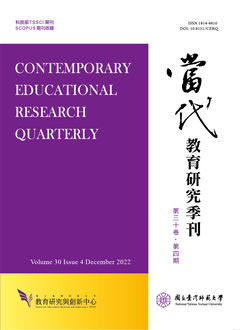

研究目的
面對後全球化狀況,受到國際關係、地緣政治以及產業鏈重組等國際因素影響,臺灣取得新發展契機,像經濟面向的投資將會帶動人才需求以及國際移動力、語言與文化的交流則會讓臺灣成為提供華語學習的重要國家、經貿地位的提升將會讓臺灣學校教育的國際化更有發展條件。本研究以後全球化為脈絡,一方面企圖能更深入釐清「全球主義/世界主義」以及「全球公民」與「世界公民」根本區別,另一方則以雙重性理想公民圖像之架構,透過國際教育課程政策與實際問題,提出國際教育理念定錨及其轉踐轉化歷程的思考。
研究設計/方法/取徑
本研究採用理論研究方法和文件分析法:一方面,通過全球化理論和相關文獻分析,探討世界體係從「全球一體化」論述轉向「後全球化」之變化;另一方面,以國際組織(UNESCO、OECD) 和臺灣素養導向課程改革與國際教育白皮書等政策文件,構建面對 21 世紀趨勢「全球公民―世界公民」之國際教育之發展框架。
研究發現或結論
本研究透過「全球公民」與「世界公民」之理念趨向架構,提出在後全球化脈絡下之國際教育理念雙重性特質,一方面是在新自由主義脈絡下所需雙語能力和國際競爭力人才培育,另一方面則在面對永續發展和生態正義所需之世界公民陶冶。研究者指出兩種理念的關係並非二元對立關係,而是一種光譜式的趨向選擇,建議學校推動國際教育時應將全球競爭力和永續責任之公民能力培養同時納入思考。
研究原創性/價值
受到嚴重特殊傳染性肺炎疫情、美中經濟對抗以及烏俄戰爭等國際關係轉變,原本世界體系架構下的「全球一體化」論述不再適用,研究者提出「後全球化」觀點,說明在地緣政治以及產業鏈重組等層面變化的影響下,臺灣取得新的發展契機,這雖讓臺灣學校教育的國際化更有發展條件,然有關「彰顯國家價值」面向之在地認同定位問題也同樣亟待關注。
教育政策建議或實務意涵
根據國際教育理念雙重性內涵分析,研究者建議可依據全球素養與永續責任之國際教育整合發展架構,能有效協助學校能從全人觀點來推動國際素養教育之理想。
Purpose
In the face of the post-globalization situation, Taiwan is gaining new developmental opportunities because of international factors such as international relations, geopolitical dynamics, and the reconstruction of industrial supply chains. These new opportunities include investment in the economy that will drive demand for human resources and international mobility, language and cultural exchanges that will position Taiwan as an important country in providing Mandarin Chinese language learning, and enhanced economic and trade status that will further favor the developmental diversity of internationalization of Taiwan’s educational institutions. This study, set in the context of post-globalization, attempts to clarify “globalism/cosmopolitanism” and to delve deeper into the fundamental distinctions between “global citizen” and “cosmopolitan citizen.” Additionally, it utilizes the framework of dual ideal citizen images to address international education curriculum policies and practical issues. It also proposes the considerations of the international education anchoring concept and its transformational process.
Design/methodology/approach
This study adopts theoretical research methods and documents analysis. On the one hand, it explores the changes in the world system from the discourse of “global unification” to “post-globalization” through analysis of globalization theories and related literature review; on the other hand, based on policy documents such as international organizations (UNESCO, OECD), Taiwan recent curriculum reform, and International Education White Paper, it constructs a development framework for international education facing 21st-century trends, focusing on “global citizens-world citizens.”
Findings/results
Through the conceptual framework of “global citizenship” and “cosmopolitan citizenship,” this study proposes the duality of international education concepts in a post-globalization context. On the one hand, it addresses the need for talent training on bilingual competencies and global competitiveness in the context of neoliberalism; on the other hand, it aims to cultivate future-oriented world citizens attuned to sustainable development and ecological justice. The researcher pointed out that the relationship between those two ideal concepts is not a contradictory binary opposition but rather a spectrum-like orientation of choices. Schools should consider cultivating both global competitiveness and civic responsibility toward sustainability when promoting international education.
Originality/value
Due to the impact of the COVID-19 epidemic, the economic confrontation between the United States and China, and the Ukrainian-Russian War, the original “global unification” under the framework of the world system is no longer applicable. The researcher proposed a new perspective of “post-globalization” and that Taiwan has gained new developmental opportunities due to geopolitics and industrial chain restructuring changes. Although these changes make the internationalization of Taiwan’s school education more conducive to development, the issue of positioning local identity in the context of “demonstrating national value” should also be considered.
Implications for policy/practice
Based on the analysis of the distinction between global citizenship and cosmopolitan citizenship, an international education development framework that integrates global competencies and sustainable responsibility is proposed to help schools promote international education from a holistic person perspective.

本著作係採用創用 CC 姓名標示-非商業性 3.0 台灣 授權條款授權.
本刊國立台灣師範大學教育研究與創新中心
106台北市和平東路一段162號 | 電話: 02-7749-3670 | E-mail: cerecerq@gmail.com
教創中心 | 師大 | 電子報 | 線上投審系統
本刊由國家科學及技術委員會人文社會科學研究中心補助經費
© 2014 CERI-NTNU
